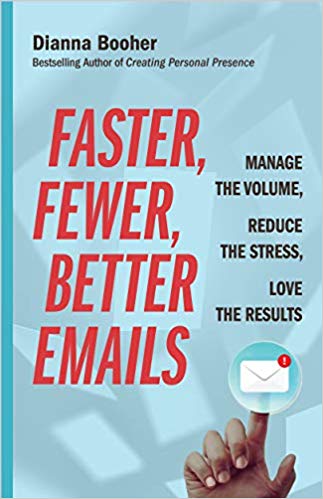The other day, I was setting up a meeting with an associate, to be held at her place of work. We'd never met and had always communicated by email.
It should have been a simple exchange: me conveying possible dates, times and numbers. She confirming that her office had the right availability. Incredibly, this took eight messages to accomplish. And it distracted both of us for three hours.
Why did it take so long? Analyzing our messages, I can see that neither of us was writing clearly enough or reading carefully enough.
She ignored one of the dates I'd mentioned and made assumptions about others. I hadn't been clear about which days of the week were not possible or highlighted hard finish times.
It made me feel nostalgic for a time when this would have taken three minutes on the phone. And I wondered, are we too reliant on email now – to the point that it rules us and not the other way around?

This thought has also been bothering leadership coach Dianna Booher, CEO of Booher Research Institute and the author of 48 books.
We talked about email management when I interviewed her for our Expert Interview podcast a few years ago.
Now she's devoted a whole book to this topic – "Faster, Fewer, Better Emails: Manage the Volume, Reduce the Stress, Love the Results."
In it, Booher quotes research showing that, if we're not careful, email can strangle our productivity. And that's expensive.
She's calculated that the cost of time spent on email can be as much as $30,000 per year, for an individual earning $75,000 plus benefits. So it literally pays to be better at email – writing it, reading it, and organizing it.
To help with the writing part, Booher offers the mnemonic MADE. It stands for Message, Action, Details, and Evidence.
Message is a short summary of what we want to say. Action is what we or the recipient need to do. Details is further necessary information, and Evidence helps with background or clarity. This might be an attachment or earlier emails pasted below.
This advice reminds me of a conversation I had with the author Mike Song a decade ago. My editor at the time had come across Song’s book, "The Hamster Revolution: How to Manage Your Email Before It Manages You." And he suggested we invite Song as a guest on our Expert Interview podcast.
I remember doubting that we'd be able to fill half an hour with email tips. In the end, I didn't want the interview to stop. Email turned out to be a great topic, and much of Song's advice is just as relevant today as it was then.
In the podcast, he gave us his top three tips. First, start friendly. Song acknowledges that conciseness is key. But he adds, "We don't want to lose all the warmth and humanity of our correspondence."
Second, turn off the ping! It's hard to return to work after notifications, whether or not they prompt us to check our messages.
And third, he suggests we "filter with folders," and divert "email that is of low priority to some type of pre-designated folder that you check once or twice a month."
After my conversation with Song, I applied all of these tips, and I still use the email folder system I set up all those years ago.
Many of Song's tips chime with Booher's more recent guide. They share a focus on saving time and maximizing all the great aspects of electronic messaging.
For example, both authors emphasize the usefulness of well-written subject lines. And they really can help you to write "Fewer, Faster, Better Emails." Consider the difference between "Conference agenda" and "Agenda for 11 Jan conference attached, feedback due 4pm today."
The detail in the second version could really help recipients, especially if they're glancing at email on their phones while on the move.
When the subject line contains the whole message, some people finish with EOM, which stands for "end of message." This tells recipients that they don't need to open the email, saving a click.
When Song shared that tip with me, I wondered if it might confuse people who didn't know what EOM meant. Finding exactly the same tip in Booher's book suggests that this acronym has become more widespread. If there's any doubt, using the word "Ends" instead of EOM might have the same effect and could be clearer.
What are your top tips for email management? Join the discussion below!
We review the best new business books and the tested classics in our monthly Book Insights, available as text or as 15-minute audio downloads.
So, if you're a Mind Tools Premium Club member or corporate user, download or stream the "Faster, Fewer, Better Emails: Manage the Volume, Reduce the Stress, Love the Results" Book Insight review now.
If you haven't already signed up, join the Mind Tools Club and gain access to our 2,400+ resources, including 390+ Book Insights. For corporate membership, ask for a demo with one of our team.

"It started with an ice-breaker. I found myself face-to-face with the head of the whole company. And as I started answering the question, I began to cry, right in front of him. " Melanie Bell
Book Insight, Communication, Mental Health, Stress, Wellbeing
"Stolen Focus" is a wake-up call. It deserves our attention – if we can spare it!
Book Insight, Empowerment, Personal Development, Stress, Wellbeing
"From below, he was a nightmare. Untrustworthy, evasive and weak, he would go weeks without speaking to any of us outside formal meetings." - Simon Bell